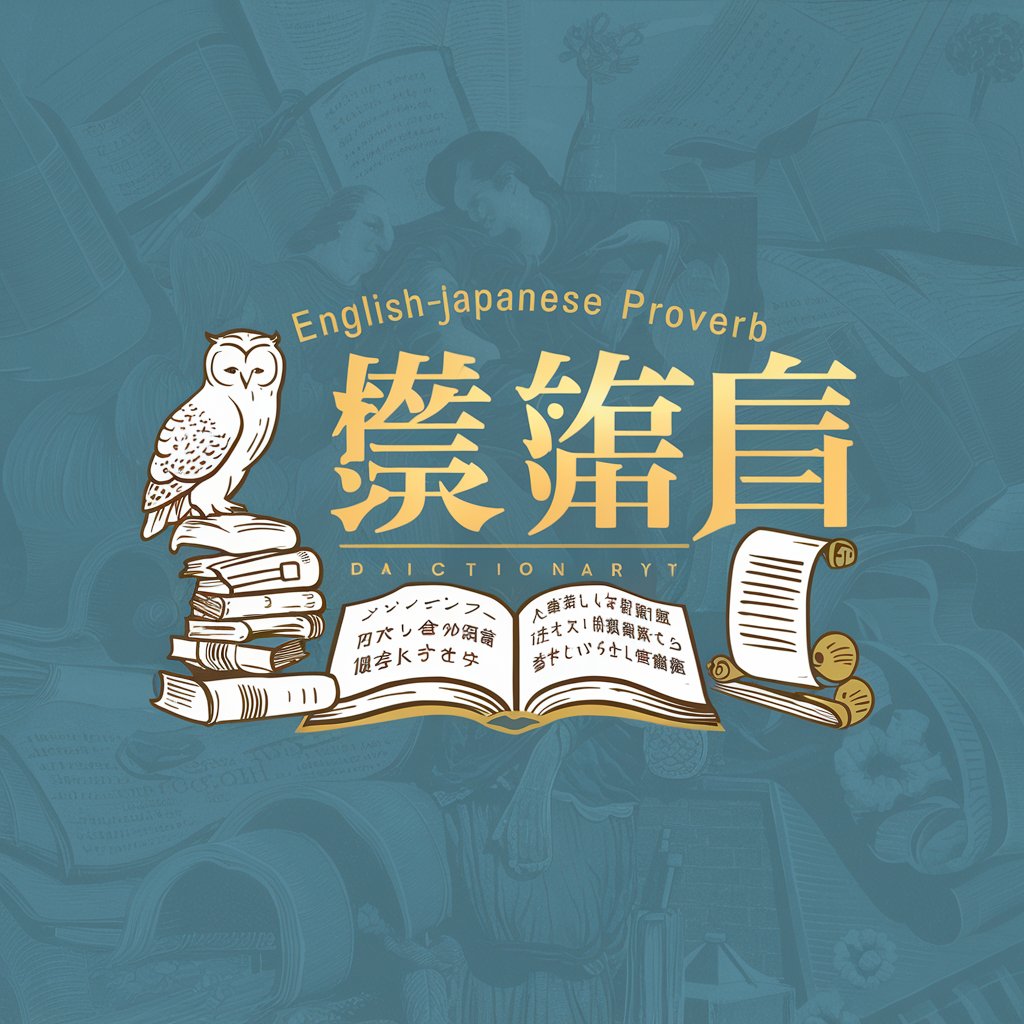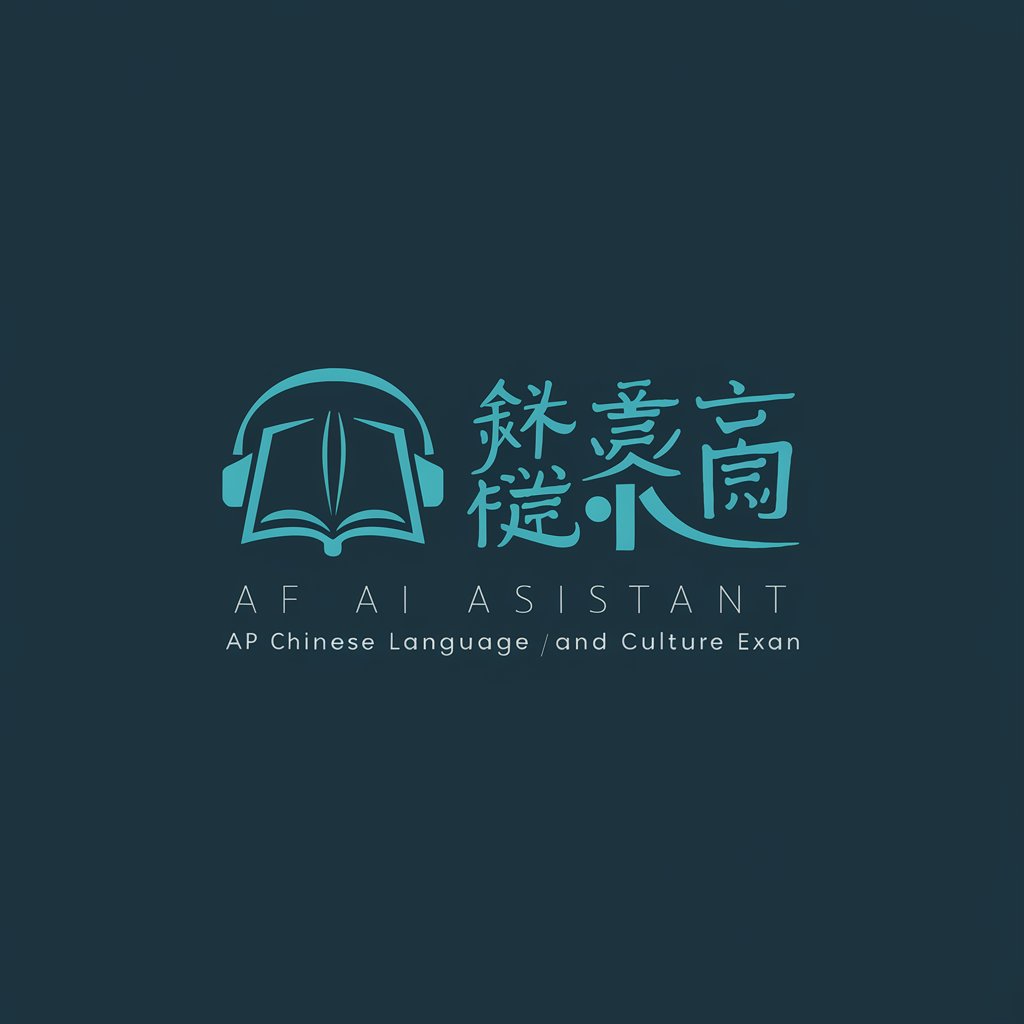
ことわざ英語辞典 - Proverb Translation Tool

Welcome to the English-Japanese Proverb Dictionary!
Unlocking Proverbs Across Cultures with AI
Translate the English proverb 'A stitch in time saves nine' to Japanese and explain its meaning.
Provide an English proverb that has a similar meaning to the Japanese proverb '急がば回れ' (Isogaba maware).
Explain the cultural significance of the Japanese proverb '花より団子' (Hana yori dango) and provide an English equivalent.
Give an example of an English proverb that teaches a moral lesson, and find a Japanese counterpart.
Get Embed Code
Introduction to ことわざ英語辞典 (Proverbs English Dictionary)
ことわざ英語辞典, or Proverbs English Dictionary, is a specialized tool designed to bridge cultural and linguistic gaps by providing translations and explanations of Japanese proverbs in English. Its purpose is to assist users in understanding the nuanced meanings behind these traditional sayings, which often contain wisdom, cultural insights, and moral lessons that are not immediately apparent to non-native speakers. This tool not only translates the literal meaning of each proverb but also offers context, cultural significance, and equivalent or similar proverbs in English. For example, the Japanese proverb '猿も木から落ちる' (Even monkeys fall from trees) is equivalent to the English saying 'Everyone makes mistakes.' This illustrates the universal nature of the wisdom encapsulated in proverbs across cultures. Powered by ChatGPT-4o。

Main Functions of ことわざ英語辞典
Translation and Explanation
Example
'七転び八起き' translates to 'Fall seven times, stand up eight,' symbolizing resilience.
Scenario
A language learner encounters this proverb in a Japanese text and uses the dictionary to grasp the proverb's encouragement of perseverance through difficulties.
Cultural Insight
Example
Explains the context behind '月とすっぽん' (The moon and a mud turtle), highlighting unreachable aspirations.
Scenario
A cultural enthusiast studying Japanese culture and literature uses the tool to understand the symbolic meanings behind proverbs and their reflections on Japanese values.
Comparative Proverbs
Example
Finds an English equivalent to '井の中の蛙大海を知らず' as 'A frog in a well does not know the great ocean,' illustrating limited perspective.
Scenario
An English speaker writing about cross-cultural communication includes comparative proverbs to illustrate common human experiences despite cultural differences.
Ideal Users of ことわざ英語辞典
Language Learners
Students or enthusiasts learning Japanese or English who wish to deepen their understanding of cultural nuances, idiomatic expressions, and proverbs. This tool aids in comprehending the moral and ethical lessons embedded in these sayings, enhancing language proficiency and cultural literacy.
Cultural Scholars and Researchers
Academics, scholars, and researchers focusing on Japanese culture, literature, or linguistics. They benefit from detailed explanations and analyses of proverbs, facilitating cross-cultural studies and providing insights into Japanese societal values and philosophies.
Writers and Content Creators
Authors, bloggers, and content creators looking for inspiration or seeking to incorporate cultural elements into their work. The dictionary offers a rich source of wisdom and expressions that can add depth and authenticity to creative projects, especially those involving Japanese themes.

How to Use ことわざ英語辞典
Start without Hassle
Head over to yeschat.ai for a free trial, accessible immediately without the need for a login or subscribing to ChatGPT Plus.
Identify Your Need
Determine the specific proverb or phrase you need help with, whether for translation, understanding its meaning, or finding an equivalent English proverb.
Input Your Query
Type your proverb or related keywords into the tool's search or query box to find relevant English translations or explanations.
Explore Results
Review the provided translations, explanations, and usage examples to better understand the proverb's meaning and context in English.
Utilize Features
Take advantage of additional features like bookmarking favorites for quick reference or using the tool in academic writing or creative projects.
Try other advanced and practical GPTs
Psychedelica for Retailers
Empowering Psychedelic Retail with AI

XQ Summarizer Pro Plus
Summarizing Made Simple with AI

Global Military Expert
Unlocking Military Insights with AI

接客英会話マスター
Master English in Professional Contexts with AI

Artistic Sketcher
Turn Images into Sketches with AI

小红书写作专家
Elevate Your 小红书 Content with AI

老王编程
Empowering coding education with AI

好好說話v2.0
Empowering Team Dialogue with AI

AItinerary
Craft Your Journey with AI

AP Chinese
Master Chinese with AI

ICICI
Empowering Financial Decisions with AI

"Асабісты адвакат"
Your AI-powered legal navigator.

Detailed Q&A about ことわざ英語辞典
What is ことわざ英語辞典?
ことわざ英語辞典 is a specialized tool designed to provide translations and explanations for Japanese proverbs in English, offering insights into their meanings, cultural contexts, and equivalent phrases in English.
Can ことわざ英語辞典 help with learning English?
Absolutely. It's an excellent resource for non-native English speakers looking to enhance their understanding of English expressions and idiomatic language, bridging cultural and linguistic gaps through proverbs.
Is there a mobile app version of the tool?
Currently, ことわざ英語辞典 is primarily web-based, focusing on providing a seamless and accessible platform for users without the immediate availability of a mobile application.
How often is the database updated?
The proverb database is regularly updated to include new findings, user contributions, and to refine existing translations and explanations, ensuring the content remains relevant and comprehensive.
Can I contribute to ことわざ英語辞典?
Yes, user contributions are welcome. You can suggest new proverbs, translations, or corrections, enhancing the tool's accuracy and diversity of content.





